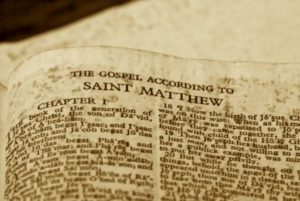‘The book of the genealogy of Jesus Christ, the son of David, the son of Abraham. Abraham was the father of Isaac, and Isaac the father of Jacob, and Jacob the Father of Judah and his brothers…’ (Mt.1:1)
 I recently asked a small Bible study group what they thought about the genealogies in the Bible, especially those of Jesus in Matthew 1 and Luke 3. The consensus was that people skip over them. One commented, ‘All that begetting gets tedious and repetitive.’ Yet Matthew’s gospel puts genealogy front and centre, as if he can’t wait to tell us who Jesus is in detail.
I recently asked a small Bible study group what they thought about the genealogies in the Bible, especially those of Jesus in Matthew 1 and Luke 3. The consensus was that people skip over them. One commented, ‘All that begetting gets tedious and repetitive.’ Yet Matthew’s gospel puts genealogy front and centre, as if he can’t wait to tell us who Jesus is in detail.
Jesus is, ‘the son of David, the son of Abraham…’ His lineage demonstrates his being the one who would fulfil the promises made to and through these great Old Testament figures, to be a blessing to all the families of the earth (Gen.12:1-3) and a king to occupy David’s throne forever (1 Chr.17:12-14, c.f. Lk.1:32-33).
The genealogy takes some tortuous routes to get to Jesus, through some less than savoury forebears. It is a lineage comprised of adulterers, prostitutes, liars, murderers, heroes, kings, shepherds, and Gentiles. No obstacles, whether a person’s unfaithfulness, obscurity, poverty, wealth, high or low social status got in the way of God’s purpose in sending his Son at the appointed time.
We are also reminded that Jesus was a man, born of of human lineage. He came from glory (Jn.1:1-2; Jn.17:5) but his humanity is a real, hungry, thirsty, weary, dirt under the fingernails humanity. In this we think of the condescension of God, that God the Son should become a man.
Historically, there have been those who could not cope with this idea, who insisted Jesus only appeared to be a man, that he didn’t actually die on the cross, and wasn’t resurrected. Matthew simply will not allow this view, called Docetism, which was born of the mistaken idea that matter is essentially evil. The Bible, however, teaches that Jesus was God made man (Col.2:9; 1 Jn.4:2; 5:6).

God, in creating mankind, affirmed two incredible truths:
‘Let us make man in our image, after our likeness (Gen.1:26) tells us that we are not like any other creature on earth, that we are God’s image-bearers, that our roots are in eternity. Human nature is only explicable when we understand it in relation to God.
‘Let them have dominion…over all the earth.’ Gen1:26) affirms that we are born to rule the earth, to steward it as kings under the authority of the King of kings.
When we consider what is wrong with the world it is plain that, to coin a phrase, ‘we are!’ The earth is dominated by creatures made in God’s image to rule, but who are in open rebellion against the God who made us and at war with each other in the world placed in our care. That charge to rule has not changed, indeed it is yet the destiny of mankind. The Psalmist reveals something of this destiny:
‘When I look at your heavens, the work of your fingers, the moon and the stars, which you have set in place, what is man that you are mindful of him, and the son of man that you care for him? You have made him a little lower than the heavenly beings and crowned him with glory and honour. You have given him dominion over the works of your hands; you have put all things under his feet…’ (Ps.8:3-6)
Of course you would be right to say that we don’t yet see this destiny as the world limps on under the tyranny of sinful man. But the New Testament holds an astonishing promise in a text that quotes this same psalm 8:
‘Now it was not to angels that God subjected the world to come, of which we are speaking. It has been testified somewhere,
‘What is man that you are mindful of him,
or the son of man, that you care for him?
You made him for a little while lower than the angels;
you have crowned him with glory and honour,
putting everything in subjection under his feet.’
Now in putting everything in subjection to him, he left nothing outside his control. At present, we do not yet see everything in subjection to him. But we see him who for a little while was made lower than the angels, namely Jesus, crowned with glory and honour because of the suffering of death, so that by the grace of God he might taste death for everyone.’ (Heb.2:5-9)
We do not yet see our destiny fully worked out, but in the glorified Jesus we see the realisation of that destiny. The writer of Hebrews goes on to write of God ‘bringing many sons to glory’ through the suffering of his son. The work of the cross, the suffering of Christ, was restoring whoever believes (Jn.3:16) to that place of dominion and stewardship we were always intended to have. He, Jesus, is our King, the King of kings, and we are to be the kings over whom he is King.
Matthew uses 53 quotes from or allusions to 25 of the Old Testament’s 39 books, to emphasise that Jesus fulfils Messianic prophecy. No fewer than sixteen such references come in quick succession in Matthew’s first two chapters. Here are a few:
At this Christmas time we recall that, ‘a virgin shall conceive and bear a son, and they shall call him |Immanuel (which means God with us).’ (Mt. 1:23 quoting Is. 7:14)
‘Behold, wise men from the east came to Jerusalem, saying, ‘Where is he who has been born king of the Jews? For we saw his star when it rose and have come to worship him.’ (Mt.2:2 alluding to Jer.23:5 and Num.24:17)
‘And you, O Bethlehem, in the land of Judah, are by no means least among the rulers of Judah; for from you shall come a ruler who will shepherd his people Israel.’ (Mt. 2:6 quoting Micah 5:2)
‘And he rose and took the child and his mother by night and departed to Egypt and remained there until the death of Herod. This was to fulfil what the lord had spoken by the prophet, Out of Egypt I call my son.’ (Mt.2:14-15 citing Hosea 11:1)
It is imperative that, like angels, shepherds, and wise men, we see and worship the babe in the manger. It is vital that we understand why he came, to restore mankind by, himself, becoming a man from a particular genealogical line, who would fulfil biblical prophecy to the letter, and restore man to his original place and purpose.
‘At present, we do not yet see everything in subjection to him. But we see him who for a little while was made lower than the angels, namely Jesus, crowned with glory and honour because of the suffering of death, so that by the grace of God he might taste death for everyone.’ (Heb.2:5-9)
Anticipating that future, the apostle John wrote:
‘See what kind of love the Father has given to us, that we should be called children of God; and so we are. The reason why the world does not know us is that it did not know him. Beloved, we are God’s children now, and what we will be has not yet appeared; but we know that when he appears we shall be like him, because we shall see him as he is. And everyone who thus hopes in him purifies himself as he is pure.’ (1 Jn.3:1-3)
In this hope have a blessed Christmas.

